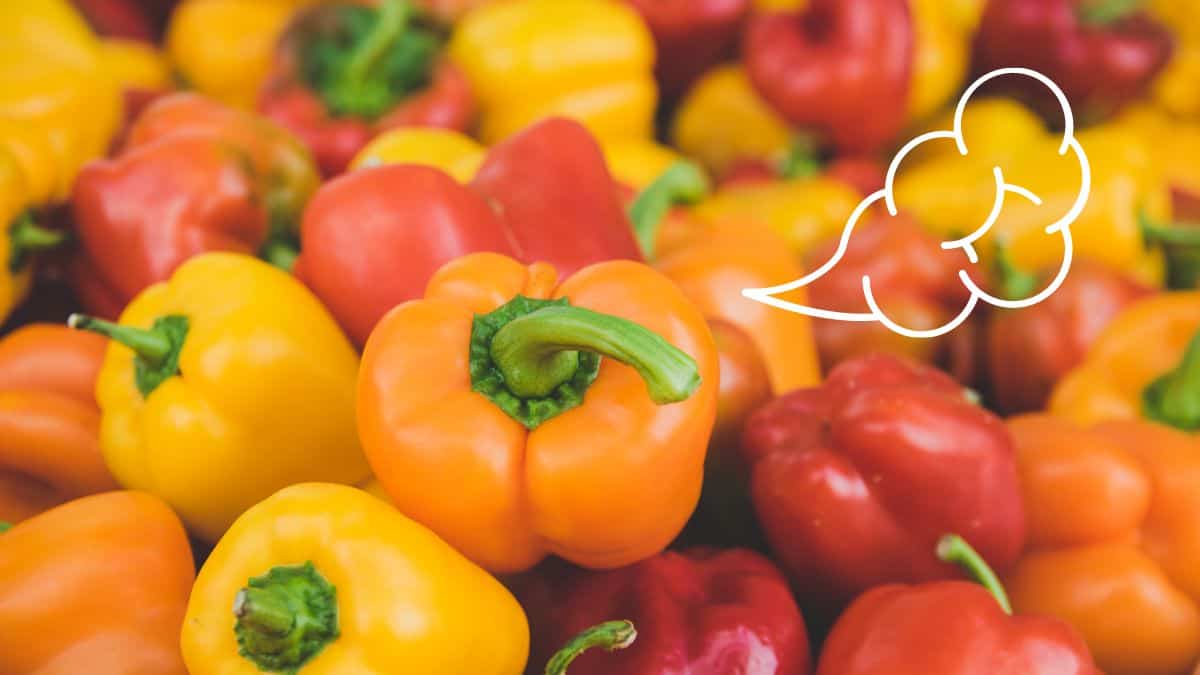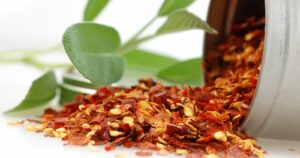Bell peppers are a popular vegetable added to many healthy recipes. But some people experience painful gas, bloating, and indigestion after eating them. So what’s the deal – do bell peppers really cause gas?
The short answer is yes, bell peppers can cause gas for some unfortunate folks. The fiber, sugars, carbs, and other compounds found naturally in bell peppers can trigger extra gas production during digestion.
Specifically, bell peppers contain modest amounts of fiber, fructose, and other carbs that may ferment in the intestines and lead to bloating, burping, and flatulence. They also belong to the nightshade family, which can bother sensitive digestive systems.
While bell peppers are very healthy, all that nutritious fiber, vitamin C, antioxidants, and other good stuff have to pass through your system. For some people, bell peppers just don’t seem to agree with their digestion.
Luckily, there are ways to enjoy bell peppers without suffering the gas afterward. Strategies like cooking, adding spices, limiting portions, and taking digestive enzymes can help reduce unwanted symptoms.
So should you stop eating bell peppers altogether because of the gas factor? Not necessarily – with the right precautions, you can still reap their nutritional benefits. Let’s explore why bell peppers cause gas, how to prevent it, and why they remain a healthy addition to your diet.
Why Bell Peppers May Cause Gas
Several components of bell peppers could be contributing to people’s gassy woes. Here are the main culprits:
Fiber Content
Bell peppers contain a modest amount of fiber—about 2 grams per cup. While fiber is great for your health overall, some types can trigger extra gas.
Soluble fiber from bell peppers needs to be broken down by gut bacteria. This process can lead to bloating, burping, and flatulence (fun!).
Fructose Malabsorption
Bell peppers also contain fructose, a natural fruit sugar. Some people don’t absorb fructose efficiently, allowing it to ferment in the intestines and cause gas.
Other Carbs
The carbohydrates and sugars naturally found in bell peppers may cause indigestion issues for sensitive folks. The body can have trouble breaking them down fully.
Nightshade Sensitivity
Bell peppers belong to the nightshade family, a group of plants that can trigger inflammation or intolerance for some people. This reaction may present as digestive distress.
So in summary, the fiber, sugars, carbs, and nightshade compounds found in bell peppers are all potential gas-producers for the unlucky few.
Tips to Prevent Bell Pepper Gas
If you feel gassy after eating bell peppers, all hope is not lost! Here are some tips to ease your discomfort:
Take a Digestive Enzyme
A digestive enzyme supplement can help properly break down the fibers, sugars, and other compounds in bell peppers to prevent indigestion issues.
Slow Down Your Eating
Eating too fast can definitely cause air swallowing, which leads to gas and bloating. Be mindful and eat bell peppers slowly to avoid gulping down extra air.
Add Spices Like Ginger
Certain spices are known to ease digestion, especially ginger. Sprinkling some ginger into bell pepper recipes can help calm any tummy troubles.
Try Cooking Them
Some people digest cooked bell peppers better than raw. Try roasting, grilling, or sautéing them to see if that helps.
Limit Portion Sizes
Stick to reasonable portion sizes of 1/2 to 1 cup of bell peppers at a time. Too much raw veg can overwhelm digestion and lead to gas.
Avoid Pairing with Other Gassy Foods
Don’t pile on the gas-producers! If bell peppers cause you issues, avoid eating them alongside notorious gas-creators like beans, broccoli, cauliflower, and carbonated drinks.
With a few minor adjustments, you can still enjoy bell peppers without suffering the gastro aftermath!
Why Are Bell Peppers Healthy Despite Causing Gas?
Even if they give you gas, bell peppers deliver ample nutrition and should still be part of a healthy diet. Here are some of their top benefits:
Bursting with Vitamin C
One bell pepper contains over 300% of your daily vitamin C needs! This powerful antioxidant supports immune function and iron absorption.
Packed with Vitamin A
Bell peppers are an excellent source of antioxidant vitamin A, which keeps your vision, skin, and organs healthy.
Great Source of Vitamin B6
The B6 in bell peppers helps turn nutrients into energy and produces important neurotransmitters in the brain.
Contains Vitamin K1
Adequate vitamin K1 intake promotes proper blood clotting and bone strength. Bell peppers are a tasty source.
Rich in Potassium
Potassium supports nerve signaling, muscle contraction, and heart health. Bell peppers provide this essential mineral.
Loaded with Phytonutrients
Brightly colored bell peppers supply health-protective plant compounds like carotenoids, quercetin, and luteolin.
Clearly, the nutritional perks outweigh the gassy downsides for most people. Moderating portions and proper preparation can help you reap bell peppers’ rewards without digestive grief.
Common Questions about Bell Peppers and Gas
If you’re wondering whether bell peppers’ gas-inducing reputation is valid, here are answers to some frequently asked questions:
Are bell peppers safe for everyone to eat?
Bell peppers are safe for most people, but some with nightshade sensitivities, fructose malabsorption, or other intolerances may experience digestive discomfort after eating them.
Do raw, cooked, or both types cause gas?
Both raw and cooked bell peppers can potentially cause gas since the indigestible compounds remain intact during cooking. However, some people report fewer issues with cooked peppers.
Do all colors of bell peppers cause gas?
Yes, all varieties including green, red, orange, yellow, and purple bell peppers contain the same gas-producing compounds and fibers. The color doesn’t change bell peppers’ impact on digestion.
What other cooking methods can reduce bell pepper gas?
Grilling, roasting, sautéing, or steaming bell peppers may be gentler on digestion than eating them raw. Removing seeds and membranes may help as well.
Should I take anything to relieve bell pepper gas?
Digestive enzyme supplements, simethicone-containing antacids, ginger, peppermint, charcoal tablets, or probiotics may ease gas and bloating after eating bell peppers.
Now that you know what causes bell pepper gas and how to avoid it, you can keep enjoying these nutritious veggies without the unpleasant symptoms! Moderation and proper food combining are key.
The Takeaway on Bell Peppers and Gas
Bell peppers are loaded with vitamins, minerals, and antioxidants that fight disease and support good health. But their fiber, sugars, carbs, and nightshade compounds do make some people gassy.
Cooking methods, spices, portion sizes, digestive aids, and avoiding other gas-producers can help reduce unwanted symptoms. Nonetheless, bell peppers remain a tasty addition to a balanced diet for most folks.
With the right precautions, you can reap bell peppers’ nutritional rewards without suffering from gas, bloating, and indigestion. Give them a try using the gas-reducing tips provided here.





